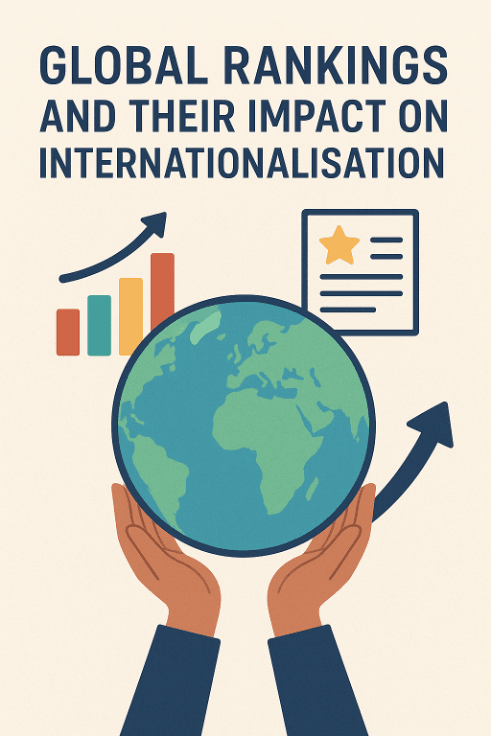Abstract
Global university rankings play a crucial role in shaping internationalisation strategies within higher education. These rankings assess institutions based on metrics such as research output, academic staff quality, global collaborations, policy decisions, funding allocations, and student recruitment. Rankings drive international engagement by encouraging institutions to expand partnerships and increase student mobility; they also present challenges.
This chapter highlights disparities in resources between well-funded and underfunded institutions, along with a focus on research at the expense of teaching quality. It addresses ethical issues surrounding data manipulation and strategies driven by rankings, which tend to favour institutions from developed countries, creating a competitive imbalance, particularly for the Global South. It also highlights how universities are increasingly implementing strategic policies aligned with ranking criteria, influencing both their approach to internationalisation and the future trajectory of higher education in a globally competitive provision.
Keywords: Global rankings, internationalisation, higher education, university evaluation, research collaboration, student mobility, academic reputation, global partnerships.

While rankings undeniably offer an opportunity for universities to enhance their global profile, they also risk encouraging a narrow view of institutional success, focusing primarily on research output, citations, and financial
resources. As universities strive to improve their ratings, they may inadvertently shift their focus away from their core missions of teaching, student support, and local community engagement. This is particularly pronounced in institutions that have traditionally prioritised education and social impact over research or global prestige.
The manipulation of metrics has been shown to be a significant concern tied to global rankings. Engaging in practices that artificially inflate their performance, such as focusing exclusively on high-impact publications or
selectively reporting data to meet ranking criteria, leads to distorted perceptions of institutional quality, as universities may be perceived as excelling in areas, they are not genuinely strong in, while other critical aspects of higher education, like teaching quality or student satisfaction, are neglected. This results in a mismatch between a university’s ranking and the actual experience students receive, ultimately undermining the integrity of the ranking system itself.
The dominance of global rankings has contributed to an increasingly competitive environment in higher education, where universities are pressured to focus on international visibility and prestige, often at the expense of equity and
social responsibility. As wealthier institutions continue to perform better in rankings due to their superior resources, universities in developing countries may find themselves further marginalised. The heavy reliance on financial metrics, such as research funding and endowments, perpetuates disparities between institutions with substantial resources and those with limited means, exacerbating global inequalities in higher education. This inequity also influences student mobility, as prospective students may be drawn to the highest-ranked institutions, often in wealthy countries, overlooking institutions that may be better suited to their educational needs or contributing meaningfully to their local communities.
Rankings should not be the sole driver of institutional decisions. Instead, universities should seek a more inclusive approach, considering diverse measures of higher education performance that account for the social, cultural, and regional contexts in which institutions operate. This would allow for a more holistic view of institutional success that values the contributions universities make to their communities, prioritises teaching quality and student experience, and recognises the role of institutions in addressing societal challenges.
A more balanced approach to rankings should integrate metrics that emphasise social responsibility, equity, and local impact, alongside traditional measures of research output that could include indicators related to community engagement, diversity, student satisfaction, and the inclusion of non-traditional students. This would encourage universities to focus not only on competing for international prestige but also on making meaningful contributions to the societies they serve.
While global rankings play a significant role in shaping the internationalisation of higher education, universities must strike a balance between enhancing rankings for visibility and ensuring that their institutional missions align with the broader goals of education, equity, and social responsibility. By adopting a more inclusive, context-sensitive approach to rankings, universities can foster sustainable and equitable outcomes in internationalisation, benefitting both their students and the global academic community. Ultimately, the future of higher education should be one that celebrates diversity, collaboration, and the shared pursuit of knowledge, rather than a race for global dominance.
You can read the whole book chapter by Dr Panchalingam Suntharalingam, Associate Professor (International) from Birmingham City University, UK

